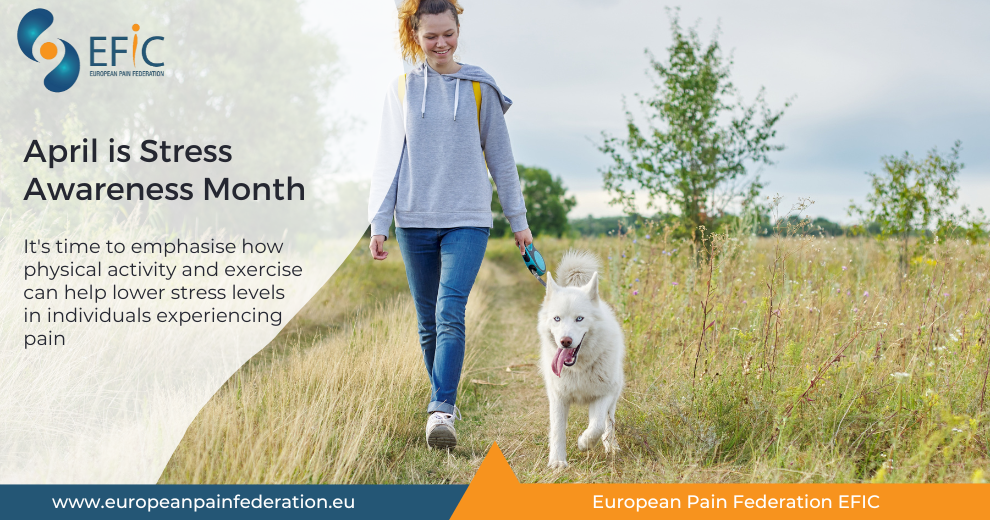Stress Awareness Month is observed every year in April. The goal of this month is to raise awareness about the causes and effects of stress on individuals, organisations, and society as a whole. It is a time to highlight the importance of stress management, self-care, and relaxation techniques in reducing stress levels and improving overall health and well-being.
Stress Awareness Month, observed every April since 1992, aims to raise public awareness about the causes and remedies of stress. In 2025, the designated theme is #LeadWithLove, encouraging individuals to approach themselves and others with kindness, compassion, and acceptance, regardless of the challenges faced.
Pain and stress are deeply interconnected, with stress both contributing to and worsening pain. Stress is the body’s natural response to physical or emotional strain, triggering physiological and psychological reactions that can intensify pain. One key factor is cortisol, the hormone released during stress, which can heighten inflammation and make pain more difficult to control. Additionally, stress often leads to muscle tension, particularly in the neck, shoulders, and back, resulting in stiffness and discomfort.
Chronic stress can also increase the likelihood of developing long-term pain conditions. Research shows that individuals under persistent stress are at higher risk of experiencing conditions such as fibromyalgia, chronic headaches, and back pain. Conversely, chronic pain itself can be a major source of stress, affecting daily life and well-being. The ongoing strain of managing pain can lead to anxiety and depression, creating a cycle where stress worsens pain, and pain amplifies stress.
Addressing both pain and stress is essential for effective pain management. Techniques such as mindfulness, relaxation exercises, and cognitive-behavioural therapy (CBT) can help break this cycle by reducing stress and improving coping mechanisms. Additionally, regular physical activity has been shown to lower stress levels and promote pain relief. Taking a holistic approach that considers both physical and emotional aspects of pain can significantly enhance quality of life, helping individuals regain control and reduce the burden of chronic pain.
The Pain in Europe XIV Congress (EFIC 2025), taking place from 24-26 April 2025 in Lyon, France, will focus on “Comorbidity of Chronic Pain and Mental Health Disorders: Breaking the Cycle.” As the largest international scientific congress on pain, #EFIC2025 will foster crucial discussions, collaboration, and innovation to advance pain research and care. Join us in driving progress towards better outcomes for those affected by pain and mental health conditions. Learn more about #EFIC2025 here.
EFIC will also be hosting an upcoming Webinar on ‘Stress, Social identification, and Mindfulness: Rethinking Pain Management’, 5 May 2025, 12:30 CET. This will examine the connection between stress and chronic pain, Join us, as experts delve into how an individual’s stress mindset and sense of social identity influence coping mechanisms and overall well-being in chronic pain conditions. We will also explore the impact of mindfulness-based stress reduction (MBSR) in enhancing psychological health, even without directly changing pain perception. Register here.
This webinar offers valuable insights into strategies that can help individuals manage pain more effectively.
If you are an #EFICAcademy member, watch these related sessions now on our education platform:
- Psychosocial Aspects of Pain
- Substance dependence and tolerance in managing pain
- Communicating with the person in pain
- Fear of pain: Concepts, evidence and application
- Behaviour change: an introduction and overview
- Patient education: The effect of positive words on pain and anxiety
- The Role of Social Context in Pain Across Lifespan
You can also read the following articles at The European Journal of Pain (EJP):
- Mental Defeat Predicts Increased Suicide Risk in Chronic Pain: A 12-Month Prospective Study
- Cognitive-affective changes mediate the mindfulness-based intervention effect on endometriosis-related pain and mental health: A path analysis approach
- Attachment in Young Adults With Chronic Pain: The Mediating Role of Cognitive Appraisals in the Relationships Between Attachment Security, Pain Coping and Functioning
- Anxiety, history of childhood adversity, and experiencing chronic pain in adulthood: A systematic literature review and meta-analysis
To find out more, visit https://www.stress.org.uk/freeresourcesstressawareness/
Watch some recent webinars related to stress and pain:
- Navigating Pain and Mental Health: Strategies for a Supportive Workplace, a joint webinar organised by EFIC and the European Association of Clinical Psychology and Psychological Treatment (EACLIPT)
- Pain in Transgender and Gender-Diverse Populations alonsgide speakers: Katelynn Boerner, University of British Columbia, Robrecht De Baere, Vrije Universiteit Brussels, Elise Cnockaert, Ghent University
